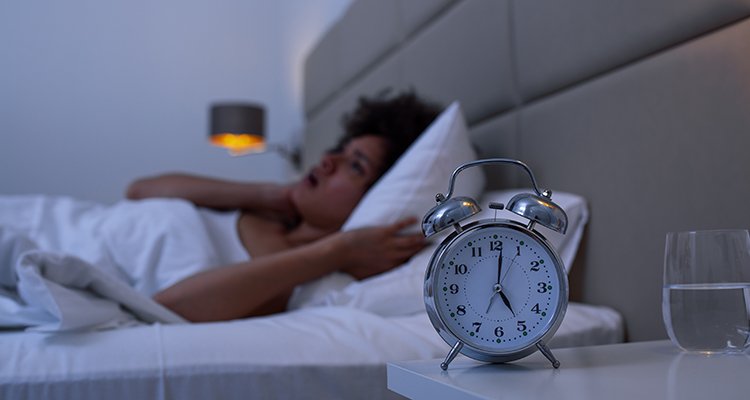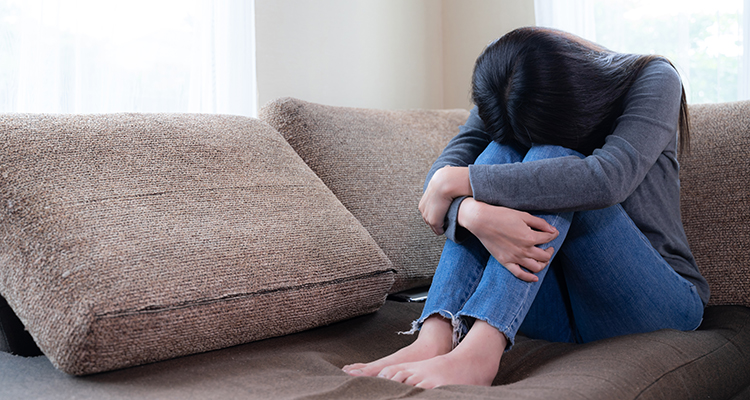Navigating Postpartum Insomnia: A Guide for Mothers
The gift of motherhood can be overwhelming. The joy of bringing your newborn home is sometimes overshadowed by endless dirty diapers and countless feedings. For many moms, having a new baby goes hand-in-hand with weeks of sleepless nights. One study revealed that new parents lose as much as 109 minutes of sleep every single night for the first year of their child’s life!

Unfortunately, many expecting mothers experience sleep interruptions long before delivery day. Many women suffer from insomnia during pregnancy — especially in the third trimester when their growing belly bump makes finding a comfortable sleeping position difficult. Difficulty falling and staying asleep is common among three-quarters of pregnant women.
These sleep troubles don’t dissipate once the baby is born. In fact, they often worsen, evolving into postpartum insomnia.
Let’s take a closer look at what postpartum insomnia is, how to ease symptoms, and when new mothers can expect relief.
Content
What is Postpartum Insomnia
Insomnia affects as many as 70 million adults. Symptoms vary but many sufferers report daytime fatigue, irritability, and the inability to focus during awake hours. For many people with insomnia, regardless of their sleep environment or the amount of time allotted to sleep, they still can’t seem to achieve a restful night’s sleep. Causes of insomnia are far-reaching and include stress, lifestyle changes, and underlying health conditions.

As the name suggests, pregnancy insomnia is different from and precedes postpartum insomnia. During pregnancy, many expecting mothers have pre-parenthood stress, vivid dreams, and countless physical changes. Heartburn, back pain, and frequent bathroom trips are just a few sleep disturbances you can expect.
Postpartum insomnia has its own set of unique causes with the main culprits being nighttime feedings, anxiety over motherhood, recovery discomfort, and other nighttime interruptions. Some mothers continue experiencing insomnia symptoms long after their infant starts sleeping longer and more consistently.
If you struggle to stay and fall asleep more than three times per week for at least three months, you’re battling chronic insomnia. Acute insomnia, though equally as disturbing, lasts for less than three months. Both pregnant women and new moms can experience a mix of chronic and acute symptoms. Even when these women manage to fall asleep, their sleep quality is not good and they’re awoken easily and more often.
Causes of Postpartum Insomnia
Most cases of insomnia are triggered by something else. Primary insomnia is rare and it means that your sleep troubles aren’t caused by anything else. Most people suffer from secondary insomnia, which means an external factor is causing your sleep trouble.

Becoming a mother is one of the biggest life changes any woman can undergo. It’s no surprise that these drastic changes to both your physical health and the environment can disrupt your natural sleep patterns.
Let’s take a closer look at the specific causes of postpartum insomnia.
Stress and Anxiety
Stress and anxiety are the leading causes of insomnia, including postpartum. Nearly 10% of new moms experience postpartum anxiety. Worrying about doing things correctly, their infant getting sick, and a myriad of other parenting decisions can make those first few months of motherhood overwhelming and stressful, creating endless sleepless nights.
Constant worry over not hearing your baby cry or something happening to your infant during the night can make it impossible to sleep. Even if you do fall asleep, many new moms wake unexpectedly and often, regardless of if their baby cries or not. Your body and mind are on constant alert following delivery. This is especially true for first-time mothers who have little experience caring for a newborn.
Without adequate sleep, stress and anxiety can increase, only making matters worse. Many new moms with postpartum insomnia enter a vicious cycle of stressing about parenting, losing sleep, and then feeling nervous or anxious about not sleeping. Each step in this process plunges you into a dangerous state of sleep deprivation.
Postpartum Depression (PPD)
An average of 85% of new moms experiences a brief period of postpartum sadness known as the maternity blues. While these feelings are usually temporary, as many as 15% of women experience PPD which is a pervasive mood disorder that persists much longer.

The most common symptoms of postpartum depression are mood swings, sadness, irritability, lack of motivation, loss of appetite, inability to bond with the baby, and insomnia. Several factors can cause PPD but most often it’s due to hormone imbalance and the overwhelming responsibility of parenthood. The more overwhelmed you feel, the more difficult it can be to sleep. Negative thoughts and fears nag at your mind as you question your abilities as a new mom and feel guilty over a lack of emotional connection to your little one.
For most moms, PPD symptoms subside over time but in severe cases, medication and therapy can help ease symptoms so you can function and get much-needed restorative sleep. Research suggests that women with PPD and postpartum anxiety are at higher risk of developing postpartum insomnia.
Demanding Schedule
This is the biggest change that new moms experience. It’s no secret that newborns wake up every 2 to 4 hours for feedings. Their schedule doesn’t change when the sun goes down which means most babies continue to wake every few hours throughout the night as well, causing major sleep disturbances for mom.
Some evidence shows that breastfed babies require even more frequent feedings than those that are bottle-fed, however, their sleep routines (including falling and staying asleep) often stabilize sooner than non-breastfed infants. To accommodate these frequent feedings, many mothers are forced to adjust their sleep schedules. They also may be on high alert, listening and waiting for signs that their newborn needs them, significantly diminishing sleep quality.
As your baby grows, changes, and develops, different things can throw them off schedule including illness, teething, nightmares, or growth spurts. These changes can progress log into their toddler years and beyond, making it difficult for moms to achieve the restful sleep they desperately need.
Hormone Imbalance
A woman’s hormones change drastically both during and after pregnancy. After childbirth, your estrogen and progesterone levels drop significantly. These drops are what cause depression and anxiety, but are also responsible for postpartum insomnia. Most hormone imbalances last for up to six months following childbirth. At this point, your estrogen and progesterone levels regulate and return to normal.

Oxytocin, also known as the love hormone, spikes during this time which can cause feelings of alertness and arousal, making it difficult to sleep. Prior to this, oxytocin is responsible for labor contractions and can control bleeding after childbirth.
Physical Changes
It’s no secret that pregnant women undergo a long list of physical changes both during and after the baby is born. Weight gain, stretch marks, and enlarged breasts are just a few of the many physical changes you may notice. While some subside, others persist. These physical changes after childbirth can make it difficult to sleep, causing either chronic or acute insomnia symptoms.
If you had a C-section birth or an episiotomy, you’ll be dealing with not only motherhood but recovery. A cesarean section is a major surgery that takes an average of six weeks to fully heal. It’s difficult to find a comfortable sleep position when dealing with stitches, pain, and swelling.
Some women report difficulty adjusting to their postpartum body. Although sleeping with a giant baby bump may have been difficult, most expecting mothers eventually find a comfortable position and are able to successfully get a few hours of shut-eye. After arriving home from the hospital, your body is completely different. Although in most cases, no longer having a large belly makes it easier to sleep, it takes some adjusting and getting used to.
Other Lifestyle Changes
Adjusting to parenthood isn’t easy. In addition to the above-mentioned changes, life postpartum is probably completely different from what it once was. The demands of motherhood are extreme. Many moms report feeling overwhelming pressure to perform. You are, after all, responsible for a new life! With this responsibility comes other changes as well that may affect your sleep.
Your sleeping arrangements and environment change instantly. Some parents let their babies sleep in the room with them while others use a baby monitor. Both can significantly affect your ability to sleep. It’s unlikely you get the same amount of sleep each night or wake and fall asleep at the same time every day. For the first several weeks, you’re adjusting to the needs and demands of your newborn. This can negatively impact your body’s sleep-wake cycle.
Postpartum Insomnia Symptoms
Now that we’ve covered the many causes of postpartum insomnia, let’s discuss some of the most common symptoms to look for. While every mother is unique and will handle the challenges of motherhood differently, if any of these symptoms persist, you may have postpartum insomnia.

- Difficulty falling and staying asleep
- Increased stress and anxiety over lack of sleep
- Mood swings and irritability
- Inability to focus during the day
- Disrupted sleep patterns
- Poor sleep quality
Sleepless nights are common for new moms but if symptoms persist or you’re struggling to function during awake hours, you may need intervention. The same is true for moms suffering from PPD. These “baby blues” usually subside within a few weeks. If not, you may need a combination of medication and therapy to help ease negative thoughts and feelings. Mothers who are breastfeeding may not be able to take certain antidepressants.
Treating and Preventing Postpartum Insomnia
You might think that postpartum insomnia symptoms will ease up the minute your baby sleeps through the night. Sadly, this is rarely the case. Children always need their mother and as they grow and develop, chances are, they’ll still interfere with your sleep on some level. The good news is, by implementing some of these changes and techniques, you can finally achieve a quality night’s sleep and have the energy and positive attitude to tackle anything parenthood throws your way.

Create a Bedtime Routine
This is often easier said than done, but creating a bedtime routine is the ultimate goal of any new mom. A consistent bedtime routine for both you and your baby helps establish boundaries and good habits moving forward. Start by lowering the lights, shutting off distractions (including the TV or your smartphone), and getting into comfortable pajamas. You can also read to your newborn, meditate, or listen to soothing music. All of these simple acts signal to your body that it’s time for sleep.
Exercise and Eat Well
Although it might be the last thing on your mind, exercise can help combat PPD and postpartum insomnia. Slowly ease into a regular exercise routine once your doctor tells you it’s safe to do so. Exercise not only reduces stress but also gives you an emotional outlet and is a form of much-needed self-care. It will also increase your heart rate and make you more tired and ready for sleep come nightfall.

Exercise and a healthy diet go hand-in-hand. All too often, new moms can barely find time to eat let alone prepare a healthy meal. It’s imperative you take time out for yourself, which includes eating a healthy, well-balanced diet. When battling postpartum insomnia, the foods you DON’T eat are just as important as the ones you do. Avoid chocolate or anything containing caffeine too close to bedtime. You should also avoid eating a large meal high in fat or sugar before bed. This can cause gas, indigestion, discomfort, and alertness.
Keep Nighttime Encounters Brief (but Meaningful)
Getting up during the night for feedings and dirty diapers is a given. While you can’t prevent your child from waking up, you can control how long you stay awake. Once you get to your baby and assess their needs, keep the encounter as brief as possible. Feed and burp your infant, change their diaper, rock them momentarily and place them back in bed. Keep the room dark and quiet to help prevent your newborn from waking fully. Avoid putting on television or anything stimulating to both you or your little one.
Consider Sleep Training
Some parents choose to implement sleep training tactics. This isn’t recommended for infants under 4 months of age. Once your child hits this milestone and if you’re both still struggling to maintain quality sleep, you can speak to your doctor about sleep training.
Several methods fall under this category including letting your baby “cry it out”, limiting naps, and checking and consoling your little one. Choose a training method that works best for both your sleep needs.
Share the Workload and Responsibility
Most new moms are surrounded by plenty of love and support. Avoid taking everything on yourself. Share the workload with your partner, family, and friends. If you live with your partner or spouse, alternate getting up for nighttime feedings. This might get you solid several hours of consecutive sleep and help you destress.
Therapy and Sleep Restriction Techniques
In addition to lifestyle changes, you can also adopt different techniques and therapies for improving sleep. If you’ve developed additional anxiety over the inability to sleep, you may need to recondition yourself. Stimulus control involves using your bed for sleep and sex only, getting up out of bed if you’re not easily falling asleep, and establishing a consistent sleep schedule.
You may also utilize sleep restriction techniques and CBT-i (cognitive behavioral therapy for insomnia) methods to help counteract postpartum insomnia.
When It’s Time to Seek Professional Help
If you’re still struggling to achieve a quality night’s sleep despite making significant changes at home, you may need to consult a sleep professional. Here are a few signs that your postpartum insomnia is not under control and maybe worsening.

Involuntary Sleeping
Some sleep-deprived moms have trouble staying awake during the day. This can put your newborn at risk. Nodding off during feedings or while rocking your baby could cause an accident or injury. Falling asleep when you don’t plan on it may also result in missed feedings, your newborn sitting in a dirty diaper, or other tragedies. It’s important to always be awake and alert when caring for an infant.
Reduced Reaction Times
Postpartum insomnia can make it difficult to focus and cause memory impairment and cognitive issues. This can also result in slow reaction times, issues balancing, and impaired coordination. These are all dangerous side effects of insomnia and could prove dangerous when taking care of your newborn. These are all signs that lack of sleep is compromising your health and your baby’s safety.
PPD Symptoms
If you’re experiencing postpartum depression symptoms in addition to trouble sleeping, it may be time for an intervention. Left untreated, postpartum depression can quickly spiral out of control. While some feelings of sadness and anxiety are normal following childbirth, persistent negative thoughts, trouble bonding with your baby, and obsessing over their health are all warning signs that your PPD may be serious and not improving. If you’re experiencing thoughts of suicide or are worried you may hurt yourself or your newborn, seek professional help immediately.
Overcome Postpartum Insomnia and Enjoy Every Minute of Motherhood
Motherhood should be filled with moments of pure joy and bliss. Although challenging, becoming a parent is one of the most rewarding experiences any woman can have. Unfortunately, both during and after childbirth, your body and mind will undergo drastic changes. While these changes are completely normal and will take some getting used to, lack of sleep can take its toll on your mental and physical well-being.

Postpartum insomnia is common, however, chronic side effects and symptoms of postpartum depression can be cause for concern. Start by making some positive changes to your sleep routine and asking for help. Lifestyle changes including exercise, adopting a healthy sleep routine, and eating well can all help curtail the effects of postpartum insomnia and depression.
In addition, Somnus Therapy has a wide range of tools and techniques to help you achieve a quality night’s sleep. A combination of therapies and resources allows you to complete this program in the comfort of your home and close to your newborn, exactly where you should be.
Click here and get ready to improve both your sleep quality and your frame of mind as you navigate the wonderful world of motherhood.














